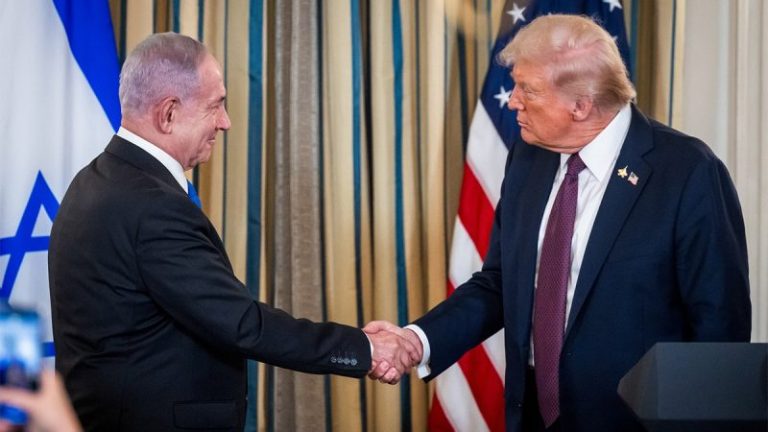The sudden announcement that Israel and Hamas had agreed to a U.S.-brokered ceasefire Wednesday night reignited a once-far-fetched question in world politics: could President Donald Trump win the Nobel Peace Prize?
If the ceasefire holds, it would signify a landmark achievement months in the making for a president who has branded himself a global peacemaker. Trump has long insisted he deserves the prize but doubts the committee would ever give it to him.
‘I’m not politicking for it,’ Trump said when asked about the prospect during the Aug. 8 signing of a peace deal between Armenia and Azerbaijan at the White House. ‘I have a lot of people that are.’
Indeed, many have nominated him — often with public fanfare.
Nominations and deadlines
The deadline for this year’s nominations was January 31. Some proposals for Trump came in before then, but many arrived after the cutoff date. If he does not win when the prize is announced Friday, he could be considered again next year.
Rep. Claudia Tenney, R-N.Y., said she nominated Trump, along with Israeli Prime Minister Benjamin Netanyahu and former Israeli Defense Minister Yoav Gallant, for their work on the 2020 Abraham Accords between Israel and Arab states.
According to the Nobel Committee, 338 candidates were nominated this year — 244 individuals and 94 organizations.
Global push for Trump’s nomination
International support for Trump’s candidacy has come from a range of leaders. On June 20, Pakistani officials said they would recommend him for ‘decisive diplomatic intervention and pivotal leadership’ during a U.S.-brokered ceasefire between India and Pakistan.
A trio of Republican lawmakers nominated him after the Alaska summit with Russian President Vladimir Putin, though that has not yet produced a ceasefire in Ukraine. Sen. John Fetterman, D-Pa., quipped that he would be ‘the Democrat leading’ the charge for Trump to win if he could broker peace in that conflict as well.
Rep. Buddy Carter, R-Ga., nominated Trump in June following the Israel-Iran ceasefire agreement. Netanyahu said he submitted his own nomination in July, while Armenian Prime Minister Nikol Pashinyan and Cambodian Prime Minister Hun Manet announced their nominations after separate U.S.-brokered peace agreements in their regions.
According to Oddspedia, Trump currently leads betting markets for the prize, followed by Sudan’s emergency response rooms and Russian opposition figure Yulia Navalnaya, widow of the late Alexei Navalny. Other contenders — such as Greta Thunberg, the United Nations Relief and Works Agency (UNRWA) and the International Criminal Court — represent causes often at odds with Trump’s policies.
Trump: ‘The people know’
Trump has expressed little faith that the Nobel Committee will recognize him, despite his flurry of diplomatic initiatives.
‘No, I won’t get a Nobel Peace Prize no matter what I do — including Russia/Ukraine and Israel/Iran, whatever those outcomes may be,’ he wrote on Truth Social in June. ‘But the people know, and that’s all that matters to me.’
Inside the Nobel Committee
The Oslo-based Norwegian Nobel Committee is made up of five members appointed by Norway’s parliament to uphold Alfred Nobel’s will, awarding the prize to whoever has done ‘the most or the best work for fraternity between nations.’
The current committee includes Jørgen Watne Frydnes, secretary general of the Utøya Foundation; Asle Toje, a foreign-policy scholar linked to the right-leaning Progress Party; Anne Enger, a former Centre Party leader; Kristin Clemet, head of Civita, a center-right think tank that promotes free-market and democratic values; and Gry Larsen, secretary general of CARE Norway.
The panel’s composition suggests long odds for Trump. With most members rooted in Norway’s center-left and centrist traditions — and only Toje aligned with the right-leaning Progress Party — the committee tends to favor humanitarian, consensus-driven peace efforts over Trump’s deal-oriented diplomacy. It is generally seen as cautious and establishment-leaning, unlikely to reward his unconventional style even amid short-term progress in Gaza.
The Obama precedent
The Nobel Committee last faced this level of scrutiny when it awarded President Barack Obama the Peace Prize just nine months into his first term in 2009, citing his promotion of nuclear nonproliferation and a ‘new climate’ in international relations.
Obama was deeply popular in Europe at the time, but by the end of his presidency U.S.-Russia relations had sunk to a post-Cold War low, and American forces were still fighting in Afghanistan and Syria — a reminder that the Nobel Peace Prize can be as politically fraught as it is symbolic.

